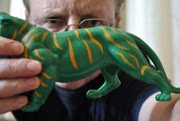What is it about the street that inspires you so much in your practice?
I’m just a city person. I find the endless array of protagonists, their situations and the myriad variables fascinating; the way you can walk down a street or onto a pier and there will never be that same assemblage of people in that space again. With people included, there will be scenes there you will never see or experience again. That flips my brain a little bit.
What is it that you are looking for whilst out on the street?
Interactions – either between people, or between people and their environment, or both.
How do you shoot? (e.g. from the hip, through viewfinder, what camera, etc.)
I shoot using the viewfinder, and firmly believe that anyone shooting from the hip should be shot. Since going digital, I’ve mainly used a big SLR, the Nikon D70 and then the D90. More recently I’ve been using a small compact, the FujiFilm X10. I just got tired of lugging a big camera around, plus last year I dropped my SLR in a lake (accidentally).
With an SLR, I find it easier to compose precisely but the physical size and conspicuousness of the beast means I’m less likely to raise the camera and take the shot than with a compact. When using a compact I take more shots, but get less keepers because of the difficulty in composing correctly. So, swings and roundabouts.
Do you believe that 'The Decisive Moment' is still relevant?
Yes, it certainly has its place. However I think that a series of pictures consisting of a stream of these becomes a bit much – it needs to be balanced with other types of shots, such as non-moments and shots that establish a sense of place, such as interesting non-peopled shots.
And do you believe that your photos are of a documentary nature? Or are they creating subjective narratives that you see?
My photos are taken quickly and not set up. But even then, a single image doesn’t tell you very much and can mislead, so it’s fun to see how people misinterpret my pictures. Of course, just putting a frame around something excludes everything outside the frame and can change the context.
On top of that, by putting two things together inside a frame you can imply a relationship that doesn’t really exist. So the narrative is definitely subjective. As Joel Sternfeld said, photos “have always been convincing lies”.
Do you associate yourself with the role of 'The Flaneur'?
Yes – even before I got into photography I used to go for long, solitary walks every day. Now, the idea of investigating the city through strolling and observation, Balzac’s “the gastronomy of the eye”, is a key part of my photography. As I understand it, the traditional flaneur found exploring the city a valuable experience in itself, and then maybe wrote about that experience. If you want to turn that into street photography, it’s important to take a camera!
What do you use to help navigate your way through the city? (e.g. The Derive, following a stranger, light, etc.)
I do identify with the idea of the derive – the aimless wander to immerse oneself in the language of the city. For me, it’s important that it really is aimless and that I have the whole day to myself with no plans and no need to look at my watch, apart from checking that I haven’t missed the last train. If I have just one appointment, it hangs over me all day.
I don’t stick in one promising spot waiting for something to happen – I get bored very quickly like that. I generally walk around quite slowly, which seems to make me see better than if I’m dashing around looking for exciting things. I don’t follow particular people (too much like stalking) or seek out good light.
I’ve also found that it’s a good idea to take a few turnings down unpromising streets so that you eventually discover different promising areas, otherwise you can end up in the same old places.
Whose work inspires you in your own?
The usual suspects: Frank’s book The Americans is the touchstone. I also like some Martin Parr, some Winogrand (although not as much as many people), Doisneau, Cartier-Bresson and my colleagues in the In-Public photo collective.

No comments:
Post a Comment